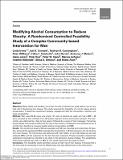Modifying alcohol consumption to reduce obesity : a randomized controlled feasibility study of a complex community-based intervention for men
Abstract
Objectives Being obese and drinking more than 14 units of alcohol per week places men at very high risk of developing liver disease. This study assessed the feasibility of a trial to reduce alcohol consumption. It tested the recruitment strategy, engagement with the intervention, retention and study acceptability. Methods Men aged 35–64 years who drank >21 units of alcohol per week and had a BMI > 30 were recruited by two methods: from GP patient registers and by community outreach. The intervention was delivered by a face to face session followed by a series of text messages. Trained lay people (Study Coordinators) delivered the face to face session. Participants were followed up for 5 months from baseline to measure weekly alcohol consumption and BMI. Results The recruitment target of 60 was exceeded, with 69 men recruited and randomized. At baseline, almost all the participants (95%) exceeded the threshold for a 19-fold increase in the risk of dying from liver disease. The intervention was delivered with high fidelity. A very high follow-up rate was achieved (98%) and the outcomes for the full trial were measured. Process evaluation showed that participants responded as intended to key steps in the behaviour change strategy. The acceptability of the study methods was high: e.g. 80% of men would recommend the study to others. Conclusions This feasibility study identified a group at high risk of liver disease. It showed that a full trial could be conducted to test the effectiveness and cost-effectiveness of the intervention. Trial registration Current controlled trials: ISRCTN55309164. Trial funding National Institute for Health Research Health Technology Assessment (NIHR HTA). Short summary This feasibility study recruited 69 men at high risk of developing liver disease. The novel intervention, to reduce alcohol consumption through the motivation of weight loss, was well received. A very high follow-up rate was achieved. Process evaluation showed that participants engaged with key components of the behaviour change strategy.
Citation
Irvine , L , Crombie , I K , Cunningham , K B , Williams , B , Sniehotta , F F , Norrie , J , Melson , A J , Jones , C , Rice , P , Slane , P W , Achison , M , Mckenzie , A , Dimova , E D & Allan , S 2017 , ' Modifying alcohol consumption to reduce obesity : a randomized controlled feasibility study of a complex community-based intervention for men ' , Alcohol and Alcoholism , vol. 52 , no. 6 , pp. 677-684 . https://doi.org/10.1093/alcalc/agx067
Publication
Alcohol and Alcoholism
Status
Peer reviewed
ISSN
0735-0414Type
Journal article
Description
This project was funded by the National Institute for Health Research Health Technology Assessment (NIHR HTA) programme (project number 12/139/ 12).Collections
Items in the St Andrews Research Repository are protected by copyright, with all rights reserved, unless otherwise indicated.

